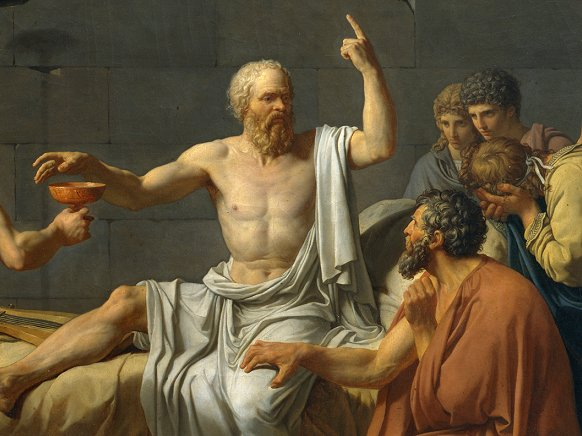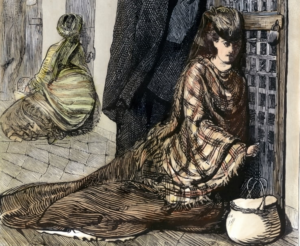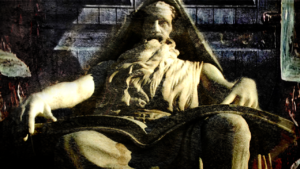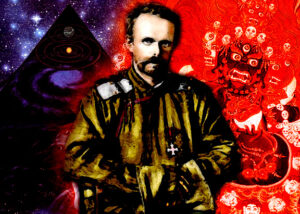On Sacrifice

At the onset of every epochal shift in the West, there has been a sacrifice to mark the occasion. The archetypal “trial and martyrdom” of a prophetic individual to sanctify the infant cultural paradigm. One finds sacrifice to be a key component in creation myths and heroic journeys the world over, such as with Prometheus’ stealing of the fire and Wotan’s loss of his eye, but for my purposes here I will be focusing on prophets of concrete historical eras from Socrates onward. It is with him our inquiry begins.
Cicero once said of Socrates that he “called down philosophy from the skies and implanted it in the cities and homes of men.” In the twilight of Homeric Greece, there began a revolution of intellect and Reason, which found its penultimate prophet in Socrates. Some may wish to point out that the Sophists also championed Reason, but the key difference is that they merely focused on how to find success in a world of relative knowledge and morals. Socrates, on the other hand, strived for a divine Truth that transcended subjective utility.
He established human ignorance as the “start of a journey” to overcome these obscurations and acquire Life’s true meaning. In this avowal of the Delphic maxim to “Know thyself,” an awareness of the inner “soul” was brought to the Classical mind and given center stage. The key to happiness was no longer rooted in material conquests or prosperity, but a life in moral harmony with the soul. This by necessity brought skepticism to the forefront as well, an instrumental tool in the fight against one’s biases and delusions in pursuit of the sublime Good, forming a “hero “ in stark antithesis to ones of old whose subjective passions were often the impetus toward great acts. With this birth of the dialectic, the Olympic gods on high became Forms, the monsters and opposing warriors ignorance, the outer hero’s quest the philosopher’s inner climb towards Truth. Unsurprisingly, Socrates was seen as a threat the old ways, a saboteur of the state and tradition’s authority in the individual’s search for meaning, and evolved into Reason’s first martyr with a sip of hemlock.
As one of the most clearly defined epochal martyrs in history, Christ’s crucifixion initiated a revolution in consciousness that upended much of the Magnesian hierarchy implanted by the post-Socratic Greek mind. Emphasis was placed more on faith than on Reason as the final arbiter of Truth. Reason still played its role, but was centered around the unitary revelation of Christ, in opposition to the Greek’s independent intellectual self-realization in relation to the empirical world and transcendent realm of pure knowledge. What had once been more of a secret cult in the Mysteries now arose to full prominence in the Christian world. The Forms were no longer sublime entities of order within a chaotic aether, but merely smaller segments of a larger Divine mind.
With this was the hierarchy of monotheism established. Any immanent divinity for Nature itself was severed, although an air of supernatural significance was still left for it as a backdrop for God’s plan to unfold upon. In a moral sense, the Christian spirit radically polarized good and evil to a greater extent than before, and introduced a new paradigm of historical dynamism. A redeeming logic was seen in the past, justifying all events leading up the current era and painting a picture of time that was linear rather than cyclical. The independent value of observing or interpreting the natural world was diminished, thus demoting man’s rational faculties below the emotional, moral or spiritual. Man’s ability to penetrate into the ineffable on his own was at best denied and at worst demonized in favor of the absolute traditional authority of the Church.
In Galileo, the archetypal martyr of Science, the idea of sacrifice becomes a bit less explicit. Unlike Socrates and Christ, Galileo was not literally killed for his ideas, but his theories were outlawed by the Inquisition, in line with the more academic aura of the era. It’s worth acknowledging that much of the historical narrative surrounding Galileo is tailored to the biases of a secularist anti-Church narrative, as Galileo did much to bring his misfortune upon himself by burning bridges between he and many colleagues. Had he not portrayed Pope Urban VIII as ‘Simplicio’ in his “Dialogue Concerning the Two Chief World Systems,” perhaps events would have played out much differently. There were also political facts to consider surrounding the Church’s decision, as the growing Protestant schism and fresh memory of the Bruno heresy left little room for the instability that Galileo’s undermining of the Aristotelian cosmology might bring.
However, none of these things matter when the Story is told, and the version that society tells itself has more archetypal significance than the specificities of what actually happened. Suffice to say that with the martyrdom of Galileo on the academic stage, the medieval universe was ended and the victory of Copernican skepticism was complete. His telescopic data, which shifted the paradigm away from the traditional Aristotelian framework established by the Church in favor of a fresh critical examination, reverberated not only through the scientific community but also the Culture itself. The Church held on to much power and influence throughout the later centuries, but could never again claim to represent the totality of human aspiration towards full knowledge of the universe. Both Protestantism’s literal Bible and Catholic sacramental authority were subverted, and yet another chain to foundation of the past was loosed.
This led to the continued decreasing of Man’s reliance on Divine mystery or spiritual authority for guidance, which displayed itself in Newtonian cosmology, the triumph of atomism and the cult of Reason. In philosophy, this movement manifested in the skeptical minds of Descartes on the mainland and Bacon in England, continuing onward to the dialectical universal frameworks of Kant. Everything physical, psychological and spiritual was now called into question, and answerable only by direct experimental contact and induction from particulars. The world still contained an intrinsic order, but it was one that was yet more distant from the previous, derived more from material patterning than Divine intelligence, and discernible only by the human mind’s own resources. Man’s independence was radically affirmed yet again, in fact one can say that the defining aspect of the entire modern movement was freedom. Freedom of Man from Nature, from God, from oppressive political, social and economic structures. And eventually, to his horror, from Man himself.
Our final sacrificial lamb keeps with the pattern established by Galileo by forfeiting something other than his life—this time, his sanity. Nietzsche was the first to completely tear off the veil covering the Enlightenment project’s failure to sufficiently replace God with science and Reason, and reveal the incapacitating isolation and madness underneath. As Man’s unbounded rational inquiry began to penetrate further and further into the universe, the discoveries it made caused the foundations it was built on to collapse into an even greater abyss of uncertainty than ever before. Newtonian physics was shaken to its core by the introduction of quantum mechanics, the implications of which were far-reaching in a culture that had made science its paragon. The uncertainty spread into biology through the likes of Darwin, and Man gradually went from being a steward of Nature appointed by God to simply the most evolutionarily developed animal.
Even then, as espoused by Kant and others, Man could still trust his rational thought and the structures it provided regardless of what the source was, and took solace in that. However with Freud, the abyss could no longer be turned away from. His introduction of the unconscious forces guiding the mind from the shadows brought the isolation to its ultimate conclusion. Not only was man alone in Nature or metaphysics, he was now a stranger even in his own mind. What Galileo had started as an optimistic liberation from demiurgic forces had ended with Man being, as Sartre put it, “condemned to be free.”
Nietzsche fully affirmed this epochal change with his famous declaration that “God is dead,” and called for a return of the warrior hero in a passionate rejection of the Socratic foundation. Western Man, weary of the road that Reason had led him down, returned to the place he began. While the cause of Nietzsche’s eventual insanity is often attributed to things like syphilis, which I’m sure played its part, it would seem there is something metaphysically deeper at play here. Bataille said of Nietzsche that “Man incarnate must also go mad,” and Nietzsche himself was quoted as saying “All superior men who were irresistibly drawn to throw off the yoke of any kind of morality and to frame new laws had…no alternative but to make themselves or pretend to be mad.” Further, to emphasize the imagery of epochal sacrifice, I do not see it as mere coincidence that Nietzsche signed his last letters as “The Crucified.”
Regardless of the methods or context, it has been a consistent universal law that any major cultural upheaval has a “price to pay,” on the part of the individual that spearheads it. Some may say it is the herd that, resistant to change, turns on those who threaten their stability with evolution. Perhaps it is merely an archetypal process that runs deeper than any conscious motives altogether. When one looks at all four stages described here as a unified process, he sees a cycle of contraction and expansion perfectly in line with Goethe’s entelechial system of Life, as well as Spengler’s subsequent description of Culture as organism. The heartbeat of the Western organism is symbolically captured by the alternation of affirming and denying Reason. It is also worth pointing out that the epochal changes described here may not have necessarily been intended by the prophets themselves. Socrates and Jesus wrote nothing, and much of the doctrinal legwork for the new cultures founded upon their words was done posthumously by the likes of Plato or Paul. Thus it would seem that the true impetus of change is not the scholar who systematizes, confining his legacy to dead letter. Rather, it is the man who is overtaken by the Word itself, and brings forth the raw material of a new world in an unbounded revelation.











